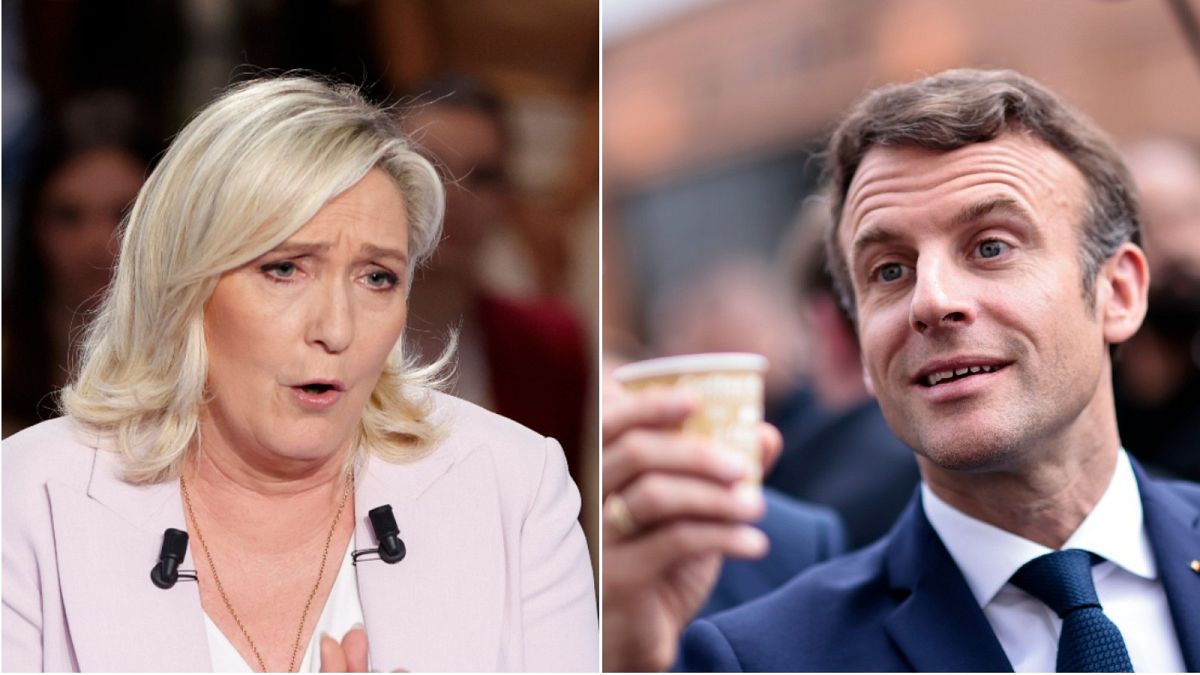Four days before the vote, Emmanuel Macron tackled Marine Le Pen over Russian financing and her "indulgence" of Vladimir Putin, as the latest polling suggests his hard-right rival is gaining ground.
The two leading candidates in Sunday's French presidential election will appear on TV on Wednesday night in a key moment in the campaign, as Marine Le Pen continues to close the gap on Emmanuel Macron according to the latest polling.
IFOP's survey updated on Tuesday evening on first-round voting intentions shows Macron on 27%, down by 0.5%, while his rival from the hard-right gains one percentage point to reach 23%, four points behind.
Another poll on Tuesday night, by Kantar-Epoka, puts Le Pen (23%) just two points behind Macron (25%), a fall of four percentage points for the current president in two weeks.
The far-left candidate Jean-Luc Mélenchon is in third place according to the polling, with IFOP giving the leader of La France Insoumise (France Unbowed) 16.5% of first-round voting intentions. The top two candidates after Sunday's vote go through to contest the second round on 24 April.
Macron and Le Pen are due to appear separately on Wednesday evening's "10 minutes to convince" slot on France's most popular TF1 channel.
Macron targeted his nearest competitor on Tuesday on a visit to Brittany. Without naming Le Pen, he criticised "other candidates" for their "indulgence regarding Vladimir Putin" and their "financing with Russia".
The current president was referring to Le Pen's reception by the Russian leader in Moscow in 2017 and the fact that her party continues to reimburse a €9 million loan to a Russian creditor.
Speaking to reporters, Macron was challenged over his dialogue with Putin, with whom he has held numerous phone conversations since the start of the war to no apparent effect.
The president was also criticised over his absence from a prime-time debate on the main public TV channel France 2 on Tuesday night. Alone among the 12 candidates not to appear, he cited diary engagements.
Macron's position has tumbled since the early days of the war in the wake of the Russian invasion, which saw the president leap to over 30% in the polls and a lead of five or six points over his rivals.
His attack on Le Pen shows he is taking her challenge seriously, as he seeks to define himself as a rampart against extremes and highlight his pro-European credentials, in contrast to the Euroscepticism of his rival from the "Rassemblement National" ('National Rally").
Le Pen expressed exasperation over criticism of her stance on Russia on Wednesday morning, insisting she was standing up for France's interests.
"Russia will not be wiped off the map," she told Europe 1 radio, arguing the country would always be a player on the world stage -- even if Putin would no longer be so if the Russian leader was proven to be personally responsible for war crimes.
She regretted the presence of her nationalist rival Eric Zemmour in the race. Without his 9-11% poll standing, she would be in pole position in the election first round, Le Pen said.
Despite the war in Ukraine and its impact on the rest of Europe, six out of ten voters say the issue of spending power is the most important for them at the election, according to polling by Harris Interactive.
The candidates will go into overdrive in the final days as they seek to galvanise their supporters and persuade the undecided to back them. Some polls suggest the election could see a record abstention rate of 30%.
If, as the polls suggest, Macron faces Le Pen in the second round, victory for the incumbent is far from the near-certainty it was in 2017.
Unlike five years ago, the president now represents the establishment and is no longer the outsider who rallied support from the imploding centre-right and centre-left as he smashed his way to power.
Disliked by many, especially on the left, Macron would no longer be able to rely on an anti-far right wave in the second round, where IFOP currently gives him a 53-47% lead over Le Pen.
She has made the rising cost of living a pivotal part of her campaign, and some elements of the president's programme such as his intention to raise the retirement age may play in her favour.
The contrast with Zemmour's firebrand nationalism has helped Le Pen cultivate a more moderate image compared to previous years.
Yet according to a report by the Jean-Jaurès Foundation, a traditionally left-wing think tank but reportedly close to Emmanuel Macron's "La République en marche" ("On the move") movement, Le Pen's programme — particularly on cultural issues — shows she "remains a candidate of the far-right".
